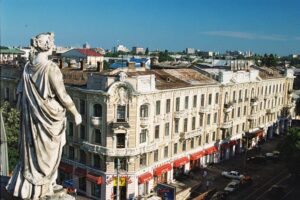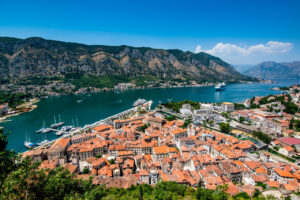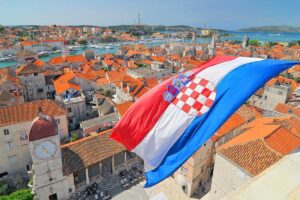
Businessman Vyacheslav Mishalov, who has significant assets in several sectors, mainly concentrated in the Dnipro region, is refraining from investing in Ukrainian real estate until values in this market are reassessed, he said in an interview with the Interfax-Ukraine news agency.
“I am not a fan of construction or the construction business because real estate prices in Ukraine are not high enough to make it a good business. Accordingly, you either have to build poorly or sell at high prices. I don’t like this format,” he said.
Mishalov added that he does not see much success among the few developers who are trying to build high-quality properties and sell them at high prices.
“There are no new construction projects, and I don’t think there will be any in the near future. While there is still some movement in Kyiv, in Dnipro I see several developers just finishing construction and fulfilling their obligations. With that level of cost, it is not interesting to me as an investor,” the businessman said.
According to his assessment, there was a surge in western Ukraine, but it was very short-lived: those who managed to get out of there with their money were lucky, while the rest will remain there with significant losses.
“I live in Dnipro, which has been hit hard throughout the war, but I have no intention of buying real estate in western Ukraine. For many reasons. I believe that it is overvalued today. And as soon as there is some prospect of stability, it will turn to rubble. So it’s not an asset, it’s some kind of psychopathy,” Mishalov believes.
According to him, it probably makes sense to invest money in some real estate in western Ukraine if you plan to move there. “But there is no quality real estate there, and there are no plans to build any, because everyone was chasing hype and speed — to get money from potential clients as quickly as possible. It’s not quality construction,” he added.
The investor noted that when he was choosing where to buy an apartment in Dnipro and Kyiv, there were literally only a few buildings that were well-designed and built.
“There needs to be a major revaluation of values in the real estate sector. Construction must begin in accordance with existing building codes,” Mishalov emphasized.
At the same time, he said that he has a project to restore the facade of a historic building in the center of Kyiv, on which he wants to spend “tens of millions of hryvnias.” According to the businessman, he was “in a good mood” after talking with the first deputy head of the State Architectural and Construction Inspection, Iryna Gioane, who on her own initiative welcomed the company’s initiative.
“We have been given permission to restore the building. We will try to finish everything beautifully by late autumn—restoring it as it was designed 100 years ago,” Mishalov said.
He added that the company had been trying to obtain this permit for a year and a half, even though there is little demand for restorers in the country, with only two teams remaining: one in Kyiv and one in Odesa.
He also clarified that his businesses operate separately from those of his father, Dmitry Mishalov, also a well-known Dnipro businessman and developer (Master Group).
As the businessman said in an interview, all his assets are already quite well structured and managed through the closed non-diversified venture corporate investment fund Fortress.
Mishalov’s investments include the financial company Ye Groshi, the provider Fregat, the Lotus network of four gas stations in Dnipro and Novomoskovsk, the petroleum products trader Lotus Oil Trading, an IT division, and the news portal Informator.
The fund, in turn, is managed by the asset management company MPSS LLC from Dnipro, owned by Serhiy Shishkin (50%), Ihor Sukhodolsky (41%), and Olga Mukhina (9%).
“I don’t have my own asset management company; I manage everything through the fund as much as possible. In my opinion, today it is one of the best tools for ownership and management, including financial flows,” Mishalov emphasized.
Source: https://interfax.com.ua/

Prices for apartments in Odesa showed the largest growth in the primary housing market of Ukraine in the first half of 2025 – up to $1130 per square meter, which is 19% more than in the same period last year, according to the real estate portal LUN.
According to LUN’s analytical data, the top five cities where prices for new buildings rose the most in January-March 2025 also included Mykolaiv (+8%, to $700/sq m), Ternopil (+7%, to $740/sq m), Chernihiv (+7%, to $750/sq m) and Lutsk (+7%, to $930/sq m).
At the beginning of July, Lviv remained the most expensive city in terms of price per square meter ($1370 per square meter), where the price in June 2025 increased by an average of 2% compared to June 2024 and by 5% since the beginning of the year. In the Lviv region, prices increased by 10% and 6%, respectively, to $890 per square meter.
Apartments in new buildings in Kyiv increased in price by 3% compared to June 2024 and 2% since the beginning of the year and reached $1290 per square meter. In the Kyiv region, prices have increased by 8% since the beginning of the year, to $820 per square meter.
Ivano-Frankivsk showed an increase of 10% in June-2025 to June-2024 and 3% for six months, reaching $850/sq. m. At the same time, in Ivano-Frankivsk region, apartments in new buildings went up by 19%, and by 9% in six months, to $880 per square meter.
“LUN notes that in Dnipro, prices for new buildings remained almost unchanged year-on-year: “plus” 1% in June 2025 to June 2024, but “minus” 1% by January 2025 – to $1070/sq. m. The situation in Kharkiv is similar: “minus” 5% by June-2024 and “plus” 5% by January-2025 – $660/sq. m.

Montenegro is one of the most affordable countries in Europe in terms of real estate prices and one of the easiest in terms of legal formalities for foreigners. In recent years, it has become particularly popular among citizens of the CIS and EU countries due to its mild climate, sea, prospects for price growth, and loyal tax policy. However, when buying an apartment or house, it is important to understand what taxes and fees you will have to pay.
Main taxes when buying real estate in Montenegro
Rate: 3% of the market value of the property as determined by the tax authorities (not always the same as the price in the contract).
The tax is paid once, within 15 days after the conclusion of the agreement and submission of documents to the tax office.
Rate: 21%, already included in the contract price.
In this case, the property transfer tax (3%) is not levied.
Property ownership tax
The rate is set by municipalities and usually ranges from 0.1% to 1% of the cadastral value (depending on the location, type, and condition of the property).
For example:
Apartment in Budva or Kotor — approximately 0.25–0.5%
Properties on the coast and in tourist areas are taxed at a higher rate
The tax is paid once a year, usually by the end of March.
Important: a penalty is charged for late payment.
Additional costs
Renting real estate: taxes for the owner
If the property is rented out, the owner is obliged to:
Obtain a short-term rental permit from the municipality.
Keep a register of guests and pay tax:
Fixed tax on rental income — 9%.
Plus tourist tax per guest — approximately €1 per night.
From 2024, compliance with these requirements will be actively monitored (introduction of electronic accounting systems).
Example
Apartment in Budva for €150,000, purchased from a private individual:
Property transfer tax: 3% = €4,500
Annual property tax (0.4%): €600
Notary + registration fees: ~€1,000
In case of rental: income tax — 9% of profit
Montenegro offers a relatively simple and predictable tax system for real estate. One-time tax on purchase — 3% or 21% (for new construction), annual tax — low. Rental income is taxed at a moderate rate but requires compliance with formalities.
Source: http://relocation.com.ua/property-taxes-in-montenegro-what-buyers-need-to-know/

The Netherlands is one of the most stable and attractive countries in Europe for real estate investments. Transparent legislation, developed market, high demand for rentals make this country interesting for both private owners and investors. However, before buying an apartment or house, it is important to understand what taxes you will have to face – both when buying and during further ownership.
The main taxes when buying real estate in the Netherlands
1. Transfer Tax (Overdrachtsbelasting)
This is the main one-time tax when buying a property on the secondary market.
Standard rate: 10.4% of the purchase price (effective January 1, 2023).
For homes purchased for own residence: 2% rate.
For buyers under the age of 35 (first-time buyers of a home up to €510,000): the rate can be 0% (exemption if all conditions are met).
Please note: if you buy a property to rent out, even as a private individual, the 10.4% rate applies.
2. VAT (BTW).
VAT only applies when you buy a new property from a property developer.
Rate: 21% of the value of the property.
In case of purchase with VAT, no transfer tax (Overdrachtsbelasting) is charged.
Annual property taxes
1. Municipal property tax (Onroerendezaakbelasting, OZB)
This tax is paid by all property owners (both natural and legal persons).
It is based on the assessed value of the property (WOZ-waarde), which is determined annually by the municipality.
The rate varies depending on the city, usually from 0.035% to 0.12%.
For example, if the WOZ-value of a house is €400,000, the tax could be between €140 and €480 per year.
2- Waterschapsbelasting – tax on water management
The Netherlands is a country with an active water infrastructure, so there is a special tax:
It is paid by all property owners.
The amount depends on the region and the type of property, but is usually between €100 and €400 per year.
3- Local charges: garbage, sewage, etc.
The property owner also pays a number of local fees that vary by municipality:
Waste disposal (afvalstoffenheffing)
Sewerage fee (rioolheffing)
Charges for public services
Together these can amount to €300-€700 per year.
Taxes on rental property
In the Netherlands, rental income is taxed according to a tax ‘box’:
In most cases, unless you are a professional landlord, the property falls into Box 3 (capital tax).
Income is not directly taxed, but the condition of the assets (including the market value of the property) is taxed.
The effective rate is between 1.2% and 1.71% of net worth (after deducting debts).
Example
Purchase of an apartment in Amsterdam for €450,000 for own residence:
Property transfer tax (2%): €9,000
Municipal tax (approx. 0.1% of WOZ): approx. €450 per year
Garbage and sewerage fees: €500 per year
Waterschapsbelasting: €200 per year
Total annual taxes and fees: about €1,150
Buying property in the Netherlands requires a good understanding of the tax system. The main one-off tax is 2% or 10.4%, depending on the purpose of the purchase. This is followed by annual local and water charges, as well as taxation in the case of renting. To properly evaluate an investment, it is important to consider not only the purchase price but also the long-term fiscal obligations. In case of doubt, it is advisable to consult a local tax advisor or notary.

Croatia is a popular country for investing in real estate on the Adriatic coast. However, before buying an apartment or a house, you should consider not only the cost of the property itself, but also purchase taxes, registration fees, and annual maintenance.
Real estate purchase tax
Rate: 3% of the appraised value determined by the local tax authority.
Who pays: the buyer.
When it is paid: within 30 days after receiving the tax notice.
If the purchase is made from a construction company (new construction with VAT), the tax is not paid, and instead, the price includes 25% VAT.
Example: Buying a second-hand apartment for €200,000 → tax = €6,000.
Registration costs
Notary: €200-800 depending on the complexity of the transaction.
Lawyer (optional): 0.5-1.5 % of the property value.
Registration in the land cadastre (Ured za katastar): €40-60.
Translation of documents (if non-resident): €50-150.
Annual real estate tax (from 2025)
Starting from January 1, 2025, a new tax on residential real estate is in force in Croatia, replacing the “resort tax”.
Who has to pay?
Owners of second properties, vacant housing, or properties that are rented out for short-term (less than 10 months).
Does not apply to housing that:
is the primary place of residence;
is rented out for a long-term lease (10+ months per year);
is used for agricultural purposes, or is recognized as unfit for human habitation.
The rate is determined by the municipality:
from €0.60 to €8/m² per year.
In the absence of a decision, the minimum rate of €0.60/m² is automatically applied.
Example: 70 m² apartment in Split → €2/m² → €140/year
Utility costs
Utility fee (kommunalna naknada):
~ €0.3-0.6/m²/month;
Depends on the city, district, type of facility.
Garbage collection fee:
€10-25/month.
Water + sewerage:
€1,5-2,5/м³.
Electricity:
The average bill for an apartment is €40-60/month (in the off-season).
Internet, TV:
€25-35/month.
Tax on rental income
If the property is rented out:
Fixed tax + tourist tax (~€300-500/year).
Additionally: annual registration of the property as a tourist facility (categorization).
It may be necessary to register as an individual entrepreneur (mandatory for incomes above €40,000/year).
Capital gains tax (on sale)
If you sell the property less than 2 years after purchase → 10% tax on the profit.
After 2 years – tax exemption (provided that it is not a commercial activity).
Real estate in Croatia remains attractive to investors and buyers from the EU, Ukraine and other countries. But since 2025, maintenance has become more expensive due to a new annual tax. When buying, it is worth considering both the initial costs (up to 4-5% in addition to the price) and the annual costs (from €500+ depending on the area and use).
Source: http://relocation.com.ua/podatki-na-neruhomist-u-horvatiyi-u-2025-rotsi-analiz-vid-relocation/

Italy is one of the most attractive countries in Europe for buying real estate. Its favorable climate, rich history, developed infrastructure, and high standard of living attract both investors and those looking for a second home on the coast or in a picturesque village. But before buying, it is important to understand the tax system: in Italy, property taxes depend on many factors, from the location of the property to the status of the owner.
Main property taxes in Italy
The Italian tax system for real estate includes both one-time taxes on purchase and annual taxes on ownership.
IMU (Imposta Municipale Unica) — municipal property tax
The IMU rate is set by local authorities and ranges from 0.46% to 1.06% of the cadastral value of the property.
The basis for calculation is the cadastral value (rendita catastale) multiplied by an adjustment coefficient (usually 160 or 168), after which the rate is applied.
When buying from a private individual:
2% of the cadastral value — if it is the primary residence for a resident buyer.
9% — if it is a secondary or investment property.
When buying from a developer:
10% VAT, plus fixed registration fees (€200 each).
Cadastral and mortgage fees are also payable — €50 each.
Special features for non-residents
Foreigners are free to buy real estate in Italy. However, there are several important nuances:
If you are not registered as a resident, IMU tax is levied even on a single property.
Property status is determined not by citizenship, but by registration with the municipality (residenza anagrafica).
If the property is rented out, the rental income is subject to mandatory declaration and taxation:
under the simplified cedolare secca scheme — 21%,
or at a progressive income tax rate: from 23% to 43%.
Calculation examples
An apartment in Rome purchased by a German citizen for vacation purposes:
Cadastral value: €80,000
IMU at a rate of 1%: approximately €1,280 per year
House in Tuscany, rented out:
IMU + TARI: from €1,500 to €2,000 per year
Plus tax on rental income: 21% or according to the scale.
Conclusion
The Italian tax system for real estate requires attention and calculations. The main annual expenses are IMU and TARI, and when purchasing, there are significant one-time fees. In the case of rental or resale, there are additional taxes on income. Therefore, before signing a contract, it is recommended to consult with an Italian lawyer or accountant to avoid surprises and fines.
Source: http://relocation.com.ua/property-taxes-in-italy-analysis-by-relocation/